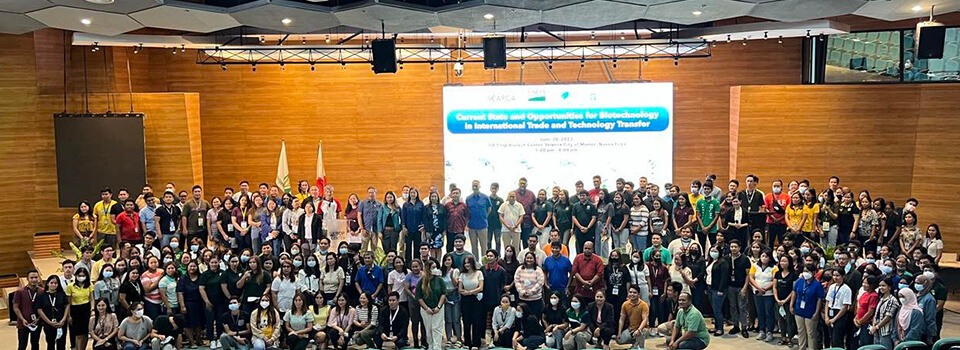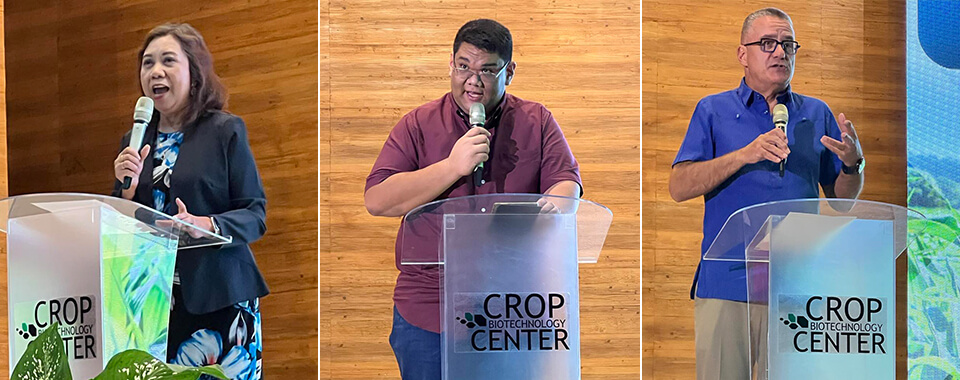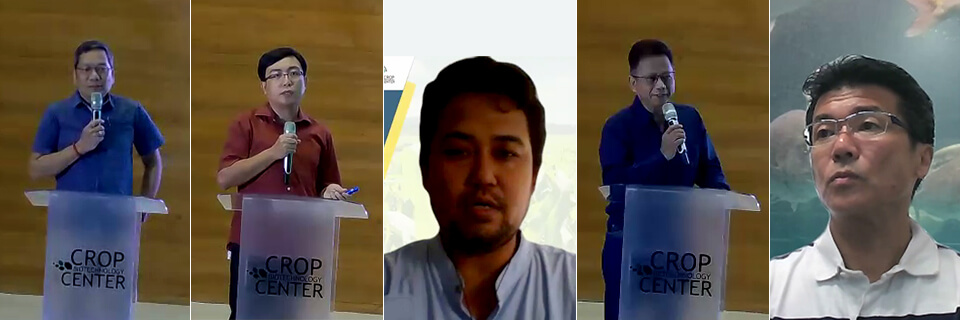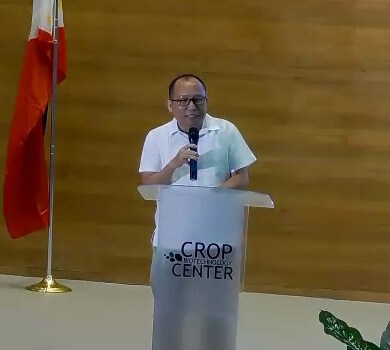The Southeast Asian Regional Center for Graduate Study and Research in Agriculture (SEARCA) continues its longstanding collaboration with the United States Department of Agriculture-Foreign Agricultural Service-Manila (USDA-FAS Manila) in contributing to the development of an enabling environment for agricultural innovations with the Forum on the Current State and Opportunities for Biotechnology in International Trade and Technology Transfer held on 30 June 2023 at the Crop Biotechnology Center (CBC) in the Science City of Muñoz, Nueva Ecija and online via Zoom.
 Over 500 participants from different government agencies, SUCs, and LGUs joined the forum onsite and online.
Over 500 participants from different government agencies, SUCs, and LGUs joined the forum onsite and online.
Dr. Rhodora Aldemita, executive director of the International Service for the Acquisition of Agri-biotech Applications (ISAAA), Inc., introduced the topics that will be discussed in the forum, including recent developments in the field that support and inspire academic researchers and technology developers to transfer agri-biotech innovations from the laboratory to the public.
In his message delivered by Mr. Jerome Cayton Barradas of the Research and Thought Leadership Department, SEARCA Director and National Academy of Science and Technology (NAST) Academician Dr. Glenn Gregorio highlighted the importance of communicating timely and credible information on new trends in biotechnology and dispelling common misconceptions that affect the progress of maximizing its potential. "As a scientist and farmer, I believe that providing safe and viable options and communicating the science behind such agricultural innovations is key to empowering our stakeholders to fully understand and make informed decisions to attain agricultural and rural development," he stated. He also urged the participants to engage with leading experts and key stakeholders in the field and find potential areas for collaboration.
 (from left) Dr. Rhodora Aldemita, Mr. Jerome Cayton Barradas, and Mr. Mark Hanzel during the opening program
(from left) Dr. Rhodora Aldemita, Mr. Jerome Cayton Barradas, and Mr. Mark Hanzel during the opening program
Similarly, Mr. Mark Hanzel, agricultural attaché of USDA-FAS from the US Embassy Manila, noted the significance of the event in addressing the misunderstanding and misinformation on agri-biotech. "This is the way that we are going to get a more informed and more understanding public in the science of biotech; and thereby gain the acceptance that these technologies deserve," he said. "Within ASEAN, the Philippines is the clear leader as far as embracing, accepting, and promoting safe, responsible, science-based technologies that will help feed everyone," he continued.
Experts such as Mr. Panfilo Guzman from ISAAA, Inc. and Dr. Reynaldo Ordonio from the Philippine Rice Research Institute (PhilRice) gave an overview of the status of biotech in the Philippines as well as the science of genetic modification and gene editing (GE), respectively. The hybrid event also featured technology-specific initiatives discussed by Mr. Agus Hari Setyo Wahyudi from PTPN XI (Sugarcane Biotechnology in Indonesia), Dr. Keitaro Kato from Kindai University (Genome Editing Technology in Marine Fish Aquaculture), and Dr. Gabriel Romero from Tropic, Inc. (Reduced Browning Banana).
 (from left to right) Resource speakers Mr. Panfilo de Guzman, Dr. Reynaldo Ordonio, Mr. Agus Wahyudi, Dr. Gabriel Romero, and Dr. Keitaro Kato during the discussions
(from left to right) Resource speakers Mr. Panfilo de Guzman, Dr. Reynaldo Ordonio, Mr. Agus Wahyudi, Dr. Gabriel Romero, and Dr. Keitaro Kato during the discussions
During the open forum, the participants wanted to learn more about other biotech rice varieties in the pipeline aside from Golden Rice. Dr. Ordonio informed the group that PhilRice had already conducted a field trial for high-iron and zinc rice, but they still need to apply for a commercial field trial. He clarified that the price would be the same as conventional varieties as they have similar inputs. Meanwhile, Dr. Romero was asked how GE can further help independent banana growers. He explained that this technology is powerful depending on the needs of the farmers and consumers. There is a big global market for reduced browning bananas, but GE can also address diseases, such as fusarium wilt. He added that if farmers have other issues with local varieties, they can coordinate with research institutions to check if GE is a possible solution in addition to conventional approaches.
 CBC Director Dr. Roel Suralta gives his closing message.In his closing remarks, CBC Director and newly minted NAST Academician Dr. Roel Suralta, affirmed their support in bringing the benefits of new technologies to those who need them the most. "The Center will remain a nurturing ground for scientific exploration and innovation by hosting researchers and students and providing them access to modern facilities," he stated. Dr. Suralta added that CBC will continue to provide capacity-building services, ensuring that biotech research institutions nationwide have the necessary skills and knowledge to embrace cutting-edge biotechnology in their work.
CBC Director Dr. Roel Suralta gives his closing message.In his closing remarks, CBC Director and newly minted NAST Academician Dr. Roel Suralta, affirmed their support in bringing the benefits of new technologies to those who need them the most. "The Center will remain a nurturing ground for scientific exploration and innovation by hosting researchers and students and providing them access to modern facilities," he stated. Dr. Suralta added that CBC will continue to provide capacity-building services, ensuring that biotech research institutions nationwide have the necessary skills and knowledge to embrace cutting-edge biotechnology in their work.
The hybrid event, which is the first of four biotech outreach activities planned for this year, aimed to contribute to an enabling environment for agricultural innovations in modern agricultural biotechnology in the Philippines and beyond. The first session was jointly organized with ISAAA, Inc., Department of Agriculture-PhilRice, and the CBC and gathered more than 500 participants onsite and online from different government agencies, state colleges and universities, and local government units.